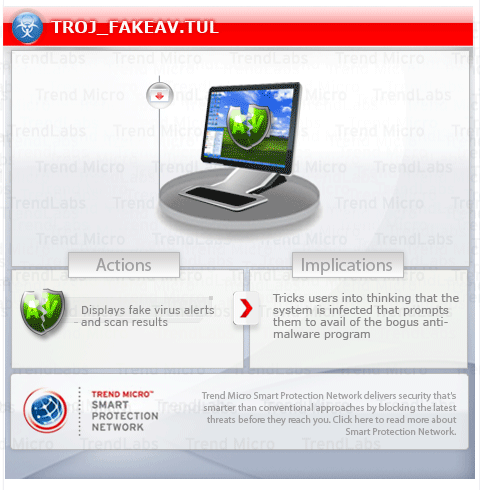TROJ_FAKEAV.TUL
Windows 98, ME, NT, 2000, XP, Server 2003


Threat Type: Trojan
Destructiveness: No
Encrypted: No
In the wild: Yes
OVERVIEW
This Trojan has received attention from independent media sources and/or other security firms.
To get a one-glance comprehensive view of the behavior of this Trojan, refer to the Threat Diagram shown below.

This Trojan may be downloaded by other malware/grayware/spyware from remote sites. It may be dropped by other malware. It may be unknowingly downloaded by a user while visiting malicious websites.
It displays fake alerts that warn users of infection. It also displays fake scanning results of the affected system. It then asks for users to purchase it once scanning is completed. If users decide to purchase the rogue product, users are directed to a certain website asking for sensitive information, such as credit card numbers.
TECHNICAL DETAILS
Arrival Details
This Trojan may be downloaded by other malware/grayware/spyware from remote sites.
It may be dropped by other malware.
It may be unknowingly downloaded by a user while visiting malicious websites.
Installation
This Trojan drops the following file(s)/component(s):
- %User Temp%\{Random folder}\mac.exe - also detected as TROJ_FAKEAV.TUL
(Note: %User Temp% is the current user's Temp folder, which is usually C:\Documents and Settings\{user name}\Local Settings\Temp on Windows 2000, XP, and Server 2003.)
Other System Modifications
This Trojan adds the following registry keys:
HKEY_CURRENT_USER\Software\mac
(Default) =
Rogue Antivirus Routine
This Trojan displays fake alerts that warn users of infection. It also displays fake scanning results of the affected system. It then asks for users to purchase it once scanning is completed. If users decide to purchase the rogue product, users are directed to a certain website asking for sensitive information, such as credit card numbers.
SOLUTION
Step 1
For Windows XP and Windows Server 2003 users, before doing any scans, please make sure you disable System Restore to allow full scanning of your computer.
Step 2
Delete this registry key
Important: Editing the Windows Registry incorrectly can lead to irreversible system malfunction. Please do this step only if you know how or you can ask assistance from your system administrator. Else, check this Microsoft article first before modifying your computer's registry.
- In HKEY_CURRENT_USER\Software
- mac
- mac
Step 3
Scan your computer with your Trend Micro product to delete files detected as TROJ_FAKEAV.TUL. If the detected files have already been cleaned, deleted, or quarantined by your Trend Micro product, no further step is required. You may opt to simply delete the quarantined files. Please check this Knowledge Base page for more information.
Did this description help? Tell us how we did.

